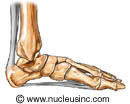|
| Achilles Tendon Injuries |
What is the Achilles tendon?
What are common Achilles tendon problems?The two main problems found in the Achilles tendon are:
Problems with the Achilles tendon may seem to happen suddenly, but usually they are the result of many tiny tears to the tendon that have happened over time. What causes Achilles tendon problems?Achilles tendon problems are most often caused by overuse or repeated movements. These movements can happen during sports, work, or other activities. For example, if you do a lot of pushing off or stop-and-go motions when you play sports, you can get microtears in the tendon. Microtears can also happen with a change in how long, hard, or often you exercise. Microtears in the tendon may not be able to heal quickly or completely. Being out of shape or not warming up before exercising may also cause Achilles tendon problems. So can shoes with poor arch supports or rigid heels. An Achilles rupture is most often caused by a sudden, forceful motion that stresses the calf muscle. This can happen during an intense athletic activity or even during simple running or jumping. Middle-aged adults are especially likely to get this kind of injury. A rupture most often occurs in sports such as basketball, racket sports (including tennis), soccer, and softball.1 A tendon already weakened by overstretching, inflammation, or small tears is more likely to rupture. What are the symptoms?Symptoms of Achilles tendon problems include swelling in the ankle area and mild or severe pain. The pain may come on gradually or may only occur when you walk or run. You may have less strength and range of movement in the ankle. A rupture of the Achilles tendon may cause a sudden, sharp pain. Most people feel or hear a pop at the same time. Swelling and bruising may occur, and you may not be able to point your foot down or stand on your toes. How are Achilles tendon problems diagnosed?Your doctor can tell if you have an Achilles tendon problem by asking questions about your past health and checking the back of your leg for pain and swelling. The doctor may ask: How much pain do you have? How did your injury happen? Have you had other injuries in the ankle area? If your symptoms are severe or do not improve with treatment, your doctor may want you to get an X-ray, ultrasound scan, or MRI. How are they treated?Treatment for mild Achilles tendon problems includes rest, over-the-counter pain medicine, and stretching exercises. You may need to wear well-cushioned shoes and change the way you play sports so that you reduce stress on the tendon. Early treatment works best and can prevent more injury. Even in mild cases, it can take weeks to months of rest for the tendon to repair itself. It’s important to be patient and not return too soon to sports and activities that stress the tendon. Treatment for severe problems, such as a torn or ruptured tendon, may include surgery or a cast, splint, brace, walking boot, or other device that keeps the lower leg from moving. Exercise, either in physical therapy or in a rehab program, can help the lower leg get strong and flexible again. The tendon will take weeks to months to heal. Although treatment for Achilles tendon problems takes time, it usually works. Most people can return to sports and other activities.
|
 The Achilles tendon connects the calf muscle to the heel bone. It lets you rise up on your toes and push off when you walk or run.
The Achilles tendon connects the calf muscle to the heel bone. It lets you rise up on your toes and push off when you walk or run.